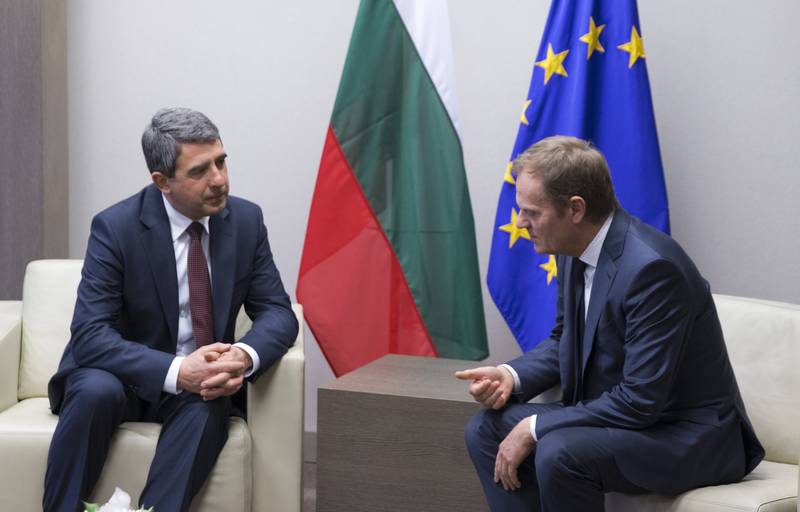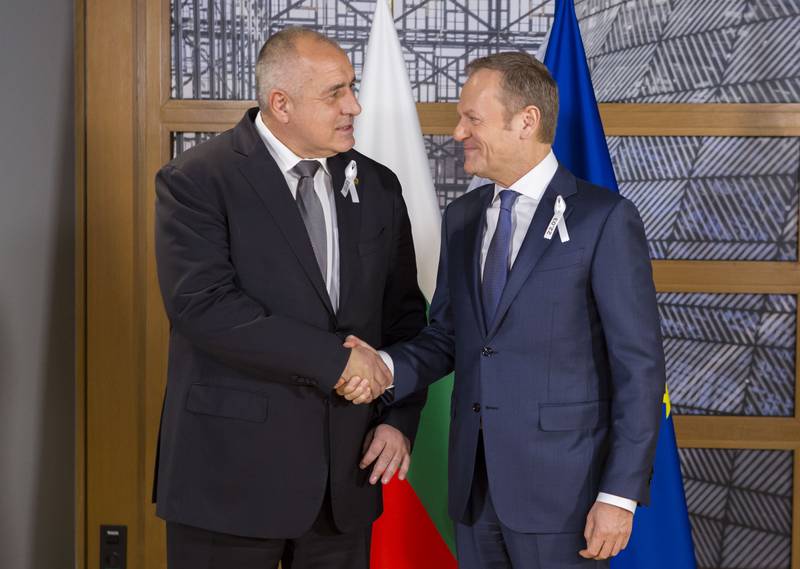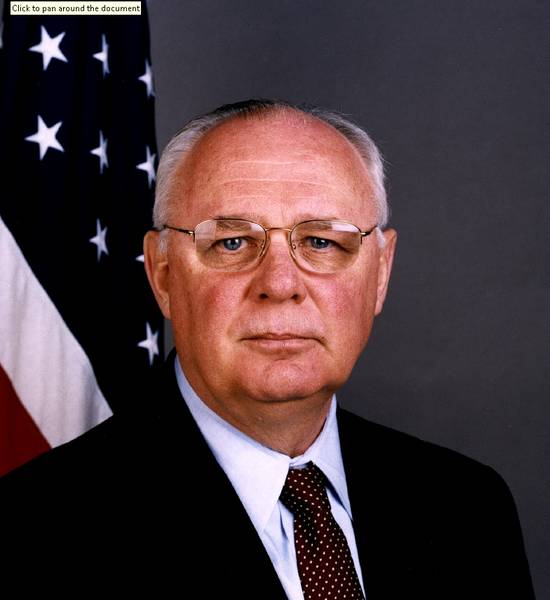Bulgaria Finally Understood that Dependence on Russia Is Bad
euinside, June 12, 2015
 Sofia seems to have finally understood that its dependence on Russia is not a viable development model and that Russia's aggression in Ukraine is a direct threat to the country's security. This is the conclusion in the article of Polish freelance journalist and analyst Dariusz Kalan, published on 9 June in the Foreign Affairs. The article is titled "Bulgaria's Turn". The author is a coordinator of the Central Europe programme in the Polish Institute for International Relations (PISM). As a journalist he wrote correspondences from various Central and Eastern European capitals, including Sofia. In his text for the American magazine Mr Kalan makes a thorough analysis of the shift of the Bulgarian foreign policy toward Russia in the past months.
Sofia seems to have finally understood that its dependence on Russia is not a viable development model and that Russia's aggression in Ukraine is a direct threat to the country's security. This is the conclusion in the article of Polish freelance journalist and analyst Dariusz Kalan, published on 9 June in the Foreign Affairs. The article is titled "Bulgaria's Turn". The author is a coordinator of the Central Europe programme in the Polish Institute for International Relations (PISM). As a journalist he wrote correspondences from various Central and Eastern European capitals, including Sofia. In his text for the American magazine Mr Kalan makes a thorough analysis of the shift of the Bulgarian foreign policy toward Russia in the past months.
"Bulgarian President Rosen Plevneliev has been saying for some time now what many leaders in Central Europe and the Balkans do not even dare to think", the Polish analyst begins his text and quotes Mr Plevneliev's speech in Gdansk on 7 May on the occasion of the anniversary from the end of World War II. In his speech [in Bulgarian] the Bulgarian head of state calls Vladimir Putin "a nineteenth-century imperialist who is creating his own spheres of influence in Europe" (which is incorrect because Plevneliev says that in an interview with the Frankfurter Allgemeine Zeitung). Several months earlier, Darius Kalan recalls, Plevneliev says in an interview with the German daily Frankfurter Allgemeine Zeitung: "We all want to see a country, which has produced Tchaikovsky, Tolstoy, and Dostoevsky, as a partner. However, facts show that we are dealing with a different Russia nowadays—a nationalist, aggressive state ruled by a president who sees Europe as an opponent, not a partner".
According to the text, Rossen Plevneliev's anti-Russian rhetoric is a "startling" change of tone for a country which was long considered to be Russia's Trojan horse in EU and which in the past wanted to become USSR's 16th republic. Since the fall of the Berlin wall only one government had relatively loose relations with Russia. A huge majority of governments tried to get Bulgaria closer to Russia. Something that was supported by the Bulgarian citizens. An opinion poll of 2012 is quoted, according to which 78% of Bulgarians then viewed Russia positively. This was the highest in EU and NATO. In 2014, however, the picture is very different. Only 22% expressed a desire their country to join the Russia-led Eurasian union.
Despite the president's actions, though, Bulgaria has had a pretty soft position in terms of Ukraine. This is to a large extent due, the author explains, to the fact that Bulgaria never had serious links with Ukraine despite that the two countries share access to the Black sea. Another reason is Bulgaria's weak position in the EU. Eight years after accession Bulgaria is lagging much behind the other new members, like Hungary, Slovakia or Romania, and is viewed as a troublemaker which is at the bottom in the EU in terms if indices of Transparency International and press freedom. In other words, the article goes on, Sofia's firm tone toward Russia has very little to do with Ukraine's stability. The explanation is rather in a combination of Moscow's offensive behaviour toward Bulgaria and the encouraging signals of the West.
Dariusz Kalan points out that Plevneliev is not alone in his anti-Russia rhetoric. Similar views shares also Minister of Defence Nikolay Nenchev who threatened to increase the defence budget in response to Russia's aggression in Ukraine and refused to extend the contract for Russian air planes MiG-29s. Foreign Minister Daniel Mitov is described in the article as "a rising political star" who is belligerently critical of Moscow.
Not so flattering are the words of the Polish analyst about Prime Minister Boyko Borissov, described in the text as "an extremely unpredictable player". According to Mr Kalan, Borissov's policy is to try not to take sides. If the crisis in Ukraine deepened, however, Borissov might have to take a more hawkish position. The Polish journalist ends his article quoting a poll by Alfa Research, according to which more than 70% of Bulgarians support Brussels instead of Moscow. "If Bulgaria is indeed Russia’s Trojan horse in the European Union, it is not a very good one", is Dariusz Kalan's conclusion.
It should be mentioned though, that this turn in Bulgarian foreign policy is quite fragile and is dependent on personalities and the current political environment. In Bulgaria there still are parties capable of forming governments that maintain close links with Russia or are pragmatists. The Bulgarian Socialist Party (BSP), although with falling support, still is viable and its electorate is strongly pro-Russian. The eternal factor in Bulgarian politics - the Movement of Freedoms and Rights (DPS) does not cherish particular love for Russia but it acts in the country as a pragmatic corporate agent which is willing to cash down any geopolitical opportunity. With falling support but quite vocal is the Ataka party which in the past year has emerged as a major spokesperson of pro-Russanism. Apart from this, on the  media front, an influential group of journalists-propagandists is being maintained who support Russia and its foreign policy.
media front, an influential group of journalists-propagandists is being maintained who support Russia and its foreign policy.
This, in addition to the dependent media environment, is a serious challenge for the sustainability of the foreign policy turn against the backdrop the already significant economic dependence. It should also not be forgotten that every critical remark is accompanied by a mitigating recall of the good historical links between Bulgaria and Russia and the love of the Bulgarians for Russian culture. The article only vaguely mentions the offensive Prime Minister Boyko Borissov launched in Brussels after the cancellation of South Stream trying to show that not Bulgaria was the reason for the cancellation of the project. Mr Borissov was tirelessly seeking support from the EU for the construction of this stream or the construction of an alternative like the project for an energy hub at the Black sea coast.
All these are problems that can be resolved with the appropriate assistance from the EU and the West at large. Bulgaria is not as vocal and firm as Lithuania, for instance, but has the potential to be if the EU succeeds to realise the energy union (as loose as it is designed) and if the Union's foreign policy stops being so fragmented and inconsistent, especially in terms of Russia.
 Boyko Borissov, Donald Tusk | © Council of the EU
Boyko Borissov, Donald Tusk | © Council of the EU Boris Johnson | © Council of the EU
Boris Johnson | © Council of the EU James W. Pardew | ©
James W. Pardew | ©